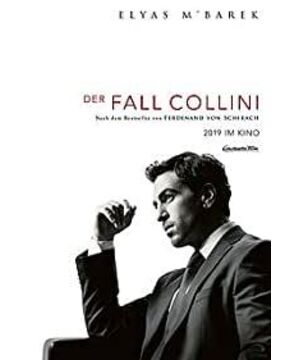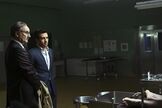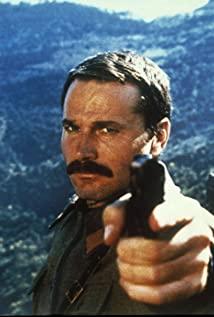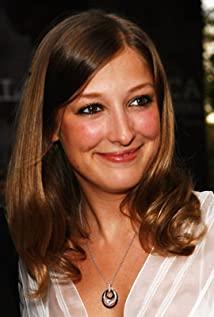I have to admire the Germans' ability to reflect on history, especially about World War II and the Holocaust, which gave birth to a unique literary genre: reflective historical novels (Vergangenheitsbewältigung). However, the Germans' ability to think deeply does not stem from persistence, but from the exploration of the lingering historical haze. The film "The Corinne Case" is adapted from the novel of the same name, as the original author Ferdinand von Schirach (Ferdinand von Schirach).
Ferdinand’s grandfather, Baldur von Schirach, was the leader of the Nazi Party’s Vienna region and was sentenced to 20 years in prison for crimes against humanity in the Nuremberg SS trial. Carrying the surname of Silach, Ferdinand suffered a lot of criticism during his growth and also experienced complicated introspection. Ferdinand is also a lawyer himself, and most of his works are also related to criminal offenses. "The Corinne Case" can be said to be a masterpiece of his long-term judicial experience and self-examination.
However, the Hawthorne-style creation of Ferdinand von Schlach does not present the story of a single individual, it is more representative, and it carries the task of retracing history and justice. The characters in the story are set in a triangle, namely the lawyer Caspar Leinen, the judged Fabrizio Collini, and the dead Hans Meyer. This relationship between characters similar to a love triangle puts the lawyer Lenny in a vacillating position. He is the son of the deceased and Corinne’s defense attorney. How does he position himself and which side he prefers? Which party's interests should be defended? This is a question that Leni, Ferdinand, and other Germans born after the massacre need to face.
The facts of the murder of Meyer are solid evidence, and Corinne is the murderer, and he does not deny it. However, when the protagonist's lawyer Lenny pushed through the layers of fog and sought a motive for the murder, the trial of the deceased Hans Mayer had just begun. I won’t go into details about the plot. The situation is more complicated, and the conflicts between character relationships and the structure of the story are also worth seeing, but they are not the focus of my discussion. Finally, it is obvious that with the slow exposure of the dust-covered files, the defendant Corinne has changed from a perpetrator to a proper "victim" and "avenger". Hans Meyer was a Nazi who killed To Corinne's father. And because of the Dreyer Act, Hans Meyer was considered an accomplice and enjoyed a retrospective period for criminal offenses. This prevented Corinne from prosecuting Meyer through legitimate legal means, so he chose to do it himself for his father. avenge.
Here is a sentence. It is also typical of the story to set the past in Italy. The reason is that Nazi Germany's journey on the Italian battlefield was once paradoxically interpreted as "just", "clean", and "honorable". This absurdity seems to be staged again in the court of the film, and the trial and defense of the deceased begins: Is Meyer very guilty?
So far, this movie seems to be another reflection on a series of post-World War II trials. As far as I know, the "Dreyer Act" that allowed Hans Meyer to escape legal sanctions is similar to the legal situation referenced in the Frankfurt-Auschwitz trial. They can be traced back to the German legal system since the 19th century, namely Criminal offenders must use their own judgment and motives to commit murder before they can be considered murder. Of course, this should not apply to wars, especially wars as unique as World War II, and they are also incompatible with international law. There are also mentions in the film. arrive. Such a consistent law-making behavior is essentially an "non-intuitive" description of some fascist behavior, more like a clever attempt to exonerate criminals. The final result, of course, is to create "exemption gold medals" for many German war criminals.
Behind this kind of legal system is the differentiated treatment of prisoners in collective crimes. In fact, a series of trials of allied war crimes in 1954 already focused on the identity of war criminals and soldiers. How should the duties and honor of soldiers be understood in wartime? The identification of the identity and value of soldiers during the war not only played a decisive role in the outcome of the trial, but also crucial to the future development of soldiers, regardless of individual or collection. The historian Kerstin von Lingen once gave such an example. After the end of World War II, many officers of the Nazi Wehrmacht conducted retrospective and reconstruction of the identity of the army during the war. They opposed the Wehrmacht and the SS to show their status. The legitimacy of what was done in the war. Such behavior, as the French scholar Maurice Halbwachs said, in the face of major state affairs, social organizations will create a "frame of reference" on their own to assist in the establishment of their own identity under the social structure. Reinhart Koselleck introduced the discussion during the trial in "Verbrechen erinnern: Die Auseinandersetzung mit Holocaust und Völkermord": Through the interpretation of the active and passive aspects of the behavior of the German army, the identity of the German army during World War II includes giving intention (Sinnstiftung) and soliciting intention (Sinnforderung). ), respectively point to the narrative construction of individual military experience and the more acceptable collective narrative construction at the national level, the latter coincides with the viewpoints of the historical law school. As a result, many war criminals were de-Nazified and escaped or eased punishment. This is exactly what Corinne wants to retaliate. The war has traumatized him for life, and judicial injustice has caused him a second injury.
Rather than saying that the main plot of the film is all about answering the question "Who is the victim?" Dialectically, the question raised by the film in a broader extension is actually "Who is the trial?" When the victim At the moment when this identity was transferred from the deceased Meyer to the defendant Corinne, the court trial actually turned, and the grief-faced judge's look of consternation explained everything. Who on earth persecuted Corinne? It was Hitler, it was the SS, it was Hans Meyer, but it was also the German judicial system, the Dreyer Act, and Dr. Richard Mattinger, who was just an intern at the time... …Even the West German Parliament at the time. In this regard, the Corinne case is not only a re-examination of a certain Nazi officer at large, but a re-examination of the Holocaust and post-war politics. It can be regarded as a reflection of the Nazi Germany's construction of the army and soldiers since the Nuremberg trial. The trial of identity.
This is the place where "The Corinne Case" is more remote than the similar plot of the film "Music Box", which traces the history of World War II and its post-war history. Of course, I'm not here to step on one. In fact, as far as the movie-watching experience is concerned, the old-school "Music Box" looks more comfortable, and the whole movie is not inferior to "The Corinne Case". But two similar films have different narrative purposes. Mike Lancelow in "Music Box" is just a fugitive war criminal. He used the testimony of a witness to portray his crimes in three points, and his own denial of history has made this war criminal. Even more abhorrent, the film finally revealed the truth, convicted him, and the hearts of the people were very happy; while the "Corinney Case" touched a wider and deeper field, the film’s presentation of Meyer’s crimes was relatively simple, and Meyer knelt down to accept The trial of the Avengers greatly reduced Meyer’s ugly image as a war criminal; what’s even more ingenious is that in the plot, Meyer was dead at the beginning, he has been tried and executed, and the suspense is no longer at the end of the film. It is whether war criminals can be executed, but a deep reflection on how to remedy the bias of the law, how to achieve justice, and the attitude towards history. Meyer is different from Lancelot. He did not escape the trial through incognito, not through escape, not through lies and sophistry, but improper law gave him the right to impunity.
The ending of the "Corinne Case" was handled very advanced. The trial was inconclusive, justice was not amended, and the salvation of the German nation was not completed. Just as the Fritz Bauer Institute established for Holocaust research in Germany in 1995 once put forward this point of view, "The memory of the Holocaust and the confrontation of national socialist crimes may already be an issue that needs urgent attention in German society. The widespread radiation caused by crimes in the past has not been fully realized by the public.” History is like this. Some mistakes may not be remedied. The trauma and guilt they leave will flow in the blood of some people, and the dangers they create I have been hiding in certain corners of the world, waiting for opportunities. When you encounter them and examine them, there is nothing you can do, but you can only turn to yourself to think and learn lessons.
View more about The Collini Case reviews











